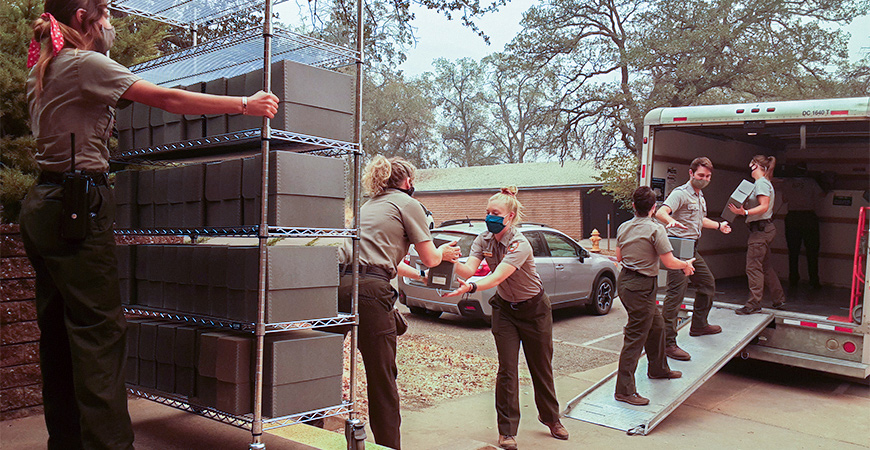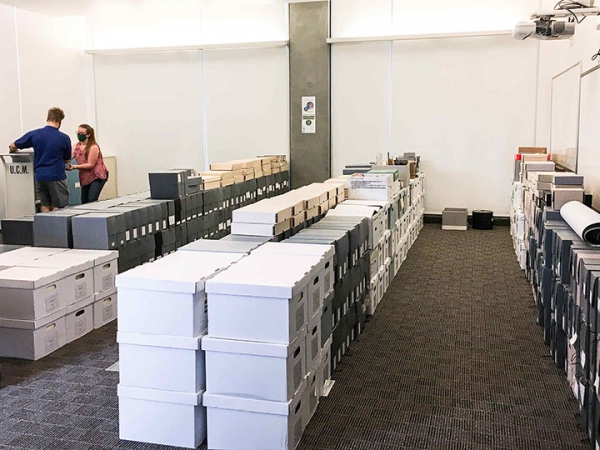
Ward Eldredge warily monitored the fire’s progress. As curator of the archives of the Sequoia and Kings Canyon National Parks, he deliberated what would need to be done if the nearby Castle Fire continued its approach toward the parks’ headquarters.
The air around Three Rivers grew thick with smoke. It was looking bad.
“The fire had exhibited some very alarming behavior — long runs, great distances travelled,” Eldredge recalled.
Residents of the Sierra Nevada foothills community spent the weekend of Sept. 12-13 preparing to evacuate. And, if the fire reached the town, Eldredge reasoned, “it’s only five more miles up canyon before we get to headquarters.
“That’s when everybody started looking at this very closely — the idea that the fire might reach the headquarters complex,” he said. “If that’s the case, there’s going to be a whole bunch of things at risk.”
The archives contain the 130-year history of Sequoia, the country’s second-oldest national park: documents dating to its founding; tens of thousands of photographs and negatives; early journals of guides and rangers; plant samples of every known species; and a collection of precious baskets from the Yokuts, some of the land’s earliest inhabitants.
All of it was at risk. To save it, quickly and safely, Eldredge turned to a relative newcomer on the landscape — the 15-year-old campus of UC Merced.

As park rangers and other local residents evacuated their homes the afternoon of Sept. 14, Eldredge called Emily Lin, the UC Merced librarian whom he knew from work digitizing collections from the parks’ archives.
He asked, “is there any chance we’d have the means of housing the collections at the library?” Lin said.
The next morning, Lin and her colleagues agreed they could help. Fortunately, a temporary space in the Leo and Dottie Kolligian Library had just opened up due to the completion of the Merced 2020 Project, the major campus expansion.
“We said ‘why don’t we make sure the collections are secure? We have this window of time to evacuate them: Let’s just do it,’” Lin said.
Finding vehicles to transport the archives, however, was another problem. With the community evacuating, Eldredge could find only one rental truck nearby. UC Merced’s facilities team provided another truck and the National Park Service supplied a van.
Early on the morning of Sept. 16, UC Merced staff set out on the 150-mile drive to the parks’ headquarters. There, as ash fell steadily from the sky, they and park staffers worked throughout the day to load up the parks’ history, carefully filling the van with delicate items such as the baskets, a photo collection of about 3,500 images from the Grant Grove area and glass plate negatives.
“The 15-foot U-Haul was filled with archival boxes stacked floor to ceiling,” Eldredge said. “Sequoia was the second park in the nation. It predates the existence of the park service. We have this complete record of what a national park is, what a national park could be, how it has changed over the course of the 20th century. That story is told in this really fascinating documentary record.”
The artifacts include documents from the Mather Mountain Party , a group of influential figures led by industrialist and conservationist Stephen Mather, whose 1915 trek into the Sierra was instrumental in creating the National Park Service the next year.
“That trip was in Sequoia National Park,” Eldredge said. “We have a photo album that was assembled and belonged to one of the participants, Mark Daniels.”
There are photo albums documenting the Civilian Conservation Corps at the end of the Great Depression; park budgets and manager logs; the diaries of individual rangers who spent summers in back country cabins; administrative correspondence with outside agencies such as the Sierra Club; and wildlife observations, including all manner of bear incidents.
“Essentially, anything that happened in Sequoia and Kings Canyon,” he said. “It’s hard to exaggerate the breadth of the records.”
Having the help of UC Merced, he said, enabled them to move 12 herbarium cabinets — large metal cases — holding the parks’ collection of 8,000 plant samples known as “vouchers,” which Eldredge said are “the ultimate proof that something is here.”
“With the changing ecosystems,” he said, “it’s really important to have that physical, tangible proof.”
As the team prepared to leave Three Rivers, Eldredge said, “I was so shattered because it had been multiple days of stress.”
“There were several lucky breaks — a compounding of good fortune. And a whole bunch of that was just the good will of UC Merced. Just utterly and completely. There were parts of the collection that we wouldn't have been able to get out without their help.”
“The partnership with UC Merced is special. UC Merced is a good resource for digitizing our archives and making them broadly available for research by students."
Lin, who heads the library’s efforts to digitally scan and store important records for research and public access, has built a relationship with Eldredge as Sequoia and Kings Canyon National Parks (affectionately known as SEKI) loaned pieces to be digitized. The cooperation, she said, had sparked discussions on how UC Merced could further collaborate with the parks and Yosemite National Park, about 75 miles northeast of the campus.
“Both Yosemite and SEKI archives are located in very vulnerable locations,” Lin said, noting that a 2018 fire nearly reached Yosemite’s archive building. “It would be a disaster if either of those were ever destroyed by fire. The other challenge is, where they're located, they’re less accessible to researchers.”
UC Merced, Lin said, hopes to also become a hub for a “mountain-valley archive,” one that encompasses the Sierra Nevada region as well as the agricultural collections of the San Joaquin Valley.
“If you try to look online, there’s not much historical information about the Valley, especially primary source material. There’s not much depth at all.”
Lin said the hope is the university will be able to scan and digitize various archives and make them widely available on platforms such as the California Digital Library.
“We have this larger vision,” Lin said. “Even though this (effort with SEKI) is a short-term response, really, both institutions look at this as a long-term relationship. We definitely have mutual goals in terms of making this history more broadly available and really strengthening the research use of these collections.”
While still young, UC Merced already is an important ally of the nearby parks. Lin’s team has digitized materials from Yosemite’s archives and the campus partners with the iconic park for research, environmental initiatives such as the Yosemite Leadership Program and arts programming such as Shakespeare in Yosemite. UC Merced also is home to the Sierra Nevada Research Institute .
“The partnership with UC Merced is special,” said Sintia Kawasaki-Yee, public affairs officer for the National Parks Service. “UC Merced is a good resource for digitizing our archives and making them broadly available for research by students.
“It also helps us connect better with our local community and stay engaged with college students who, over time, become national park supporters and advocates. It’s one of those partnerships that helps us stay current.”
The next step for the SEKI archives will be to take an inventory of everything. From there, the parties will decide on a plan for digitizing the records and securing everything for the future.
“Pending some more formal agreements, hopefully we can reach a situation where the public access and security of the collections are both improved,” Eldredge said. “I think this partnership really makes that seem feasible. And certainly Merced’s clear commitment to the well-being of these records has been demonstrated beyond my wildest imaginings.”
Eldredge said it was “really satisfying” to know the archives are safe and sound. The response of UC Merced and the many people who pitched in to help is “hugely gratifying,” he said.
“It’s good to know that that many people really value what this is,” he said.
“In a lot of ways, Sequoia and Kings Canyon are quintessential parks and are positioned historically as an ideal example of the evolution of the national park idea — one of the nation’s contributions to humanity and to the human experience.”






